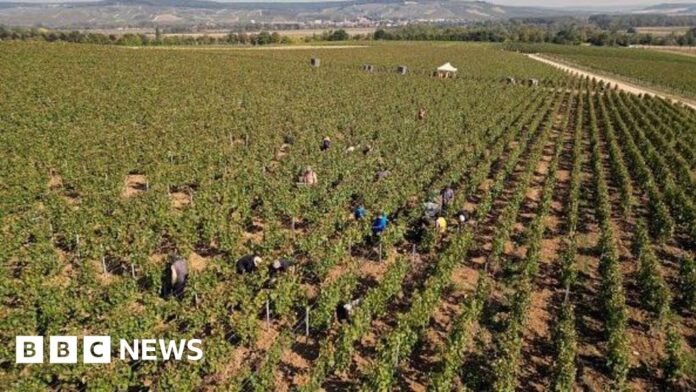Conditions for grape-pickers in France’s champagne business lie at the heart of a human trafficking trial that has opened in the eastern city of Reims.
Three people – a woman from Kyrgyzstan, a man from Georgia and a Frenchman – are accused of exploiting more than 50 seasonal workers, mainly from west Africa.
The workers – all undocumented migrants – were found during the 2023 September harvest living in cramped and unhygienic conditions in a building at Nesle-le-Repons, southwest of Reims in the heart of champagne country.
They had been recruited via a Whatsapp group message for the West African Soninke ethnic community living in Paris, which promised “well-paid work” in the Champagne region.
Aged between 16 and 65 at the time, the 48 men and nine women came from Mali, Mauritania, Ivory Coast and Senegal. Many are attending Thursday’s trial.
“They shouted at us in Russian and crammed us into this broken-down house, with mattresses on the floor,” Kanouitié Djakariayou, 44, told La Croix newspaper.
“There was no clean water, and the only food was a bowl of rice and rotten sandwiches.
“I never thought the people who made champagne would put us up in a place which even animals would not accept.”
“What we lived through there was truly terrible. We were traumatised by the experience. And we have had no psychological support, because when you have no papers, you have no rights either,” Doumbia Mamadou, 45, told the local newspaper L’Union.
Tipped off a week later by a local resident, labour inspectors visited the scene and documented conditions which “were a serious breach of the occupants’ safety, health and dignity,” in the words of state prosecutor Annick Browne.
The prosecution says living and eating areas were outside, unprotected from the elements; toilets were filthy; showers were inadequate with only intermittent hot water; and the electrics were a safety hazard.
In addition the migrants were working ten hours a day with only 30 minutes for lunch, having been transported to the vineyards squatting in the back of trucks. They had no written contract, and the pay they received bore “no relation to the work performed,” according to the prosecution.
“The accused had a total disregard for human dignity,” said Maxime Cessieux, who represents some of the migrants.
The 44 year-old female suspect, named Svetlana G., ran a recruitment agency called Anavim, which specialised in finding labour for the wine industry. The two others were her associates.
In addition to the charge of human trafficking, the woman is also accused of undeclared labour, employing foreigners without permits, inadequate pay, and lodging vulnerable people in unfit conditions. All three face jail terms of up to seven years and large fines fines if they are convicted.
The case has raised questions about the extent of worker exploitation in the €6bn (£5.1bn) champagne industry. With every grape having to be picked by hand, producers rely on some 120,000 seasonal labourers every autumn, many of whom are recruited via agencies.
In 2023 six grape pickers died from suspected heatstroke during the harvest in the Champagne and Beaujolais regions – and in recent years there have been two other criminal cases in which agents have been found guilty of maltreatment of migrant vendangeurs.
Trade unions have said some champagne houses hide behind middlemen, and they want the law changed so that producers can lose the “champagne” label if they are found to have used illegal labour – even indirectly.
“It should not be possible to harvest the grapes of champagne using human misery,” said Jose Blanco of the CGT union.
But the main body representing champagne producers – the Comité Champagne — said mistreatment of workers happened very rarely and when discovered was immediately stopped.
The Comité is represented at the trial as a civil plaintiff, in recognition of the “damage done to the brand” by these “unacceptable practices.”






